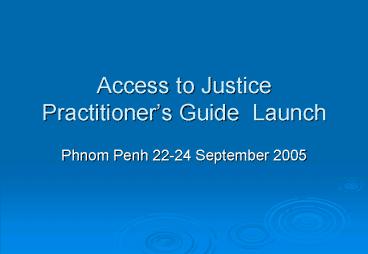Access to Justice Practitioners Guide Launch - PowerPoint PPT Presentation
1 / 15
Title:
Access to Justice Practitioners Guide Launch
Description:
Presentation of Country Office Studies, as an application of the 10 Steps methodology; ... presentation, and overall for Working Groups & Practical Case Studies) ... – PowerPoint PPT presentation
Number of Views:14
Avg rating:3.0/5.0
Title: Access to Justice Practitioners Guide Launch
1
Access to Justice Practitioners Guide Launch
- Phnom Penh 22-24 September 2005
2
Objectives of the workshop
- To launch and familiarise participants with the
Access to Justice Practitioners Guide its key
issues and methodology and to share knowledge and
experience among practitioners in the
Asia-Pacific region - To test the relevance of the practitioners guide
and its suggested methodology, suggest additional
areas of study, identify gaps and examples - To develop a strategy for next steps for the
rights and justice network at a regional and
global level. Strengthen and expand the community
of practice through partnerships with key
stakeholders and identify issues for future
programming
3
Participants
- Country offices (18 COs represented)
- Government or non-government partners selected by
the Country Offices - Practitioners from the region (activists, NGOs,
academic) - Other resource persons who contributed to the
practitioner's guide
4
Agenda Structure-Day 1
- In conjunction with Country Office launch of
National Report - Half day of official launch of Cambodia report
and (wider audience)- introduction to access to
justice issues (links with poverty reduction,
human rights and access to justice) and
presentation of products - 2 days of training/substantial discussions in
plenary and working groups reflecting the
structure of the guide
5
Agenda Structure- Day 2 and 3
- Introduction to the programming methodology (10
Steps) - Three main sessions covering the substantial
areas of the guide (Normative Protection,
Capacity to Demand, Capacity to Provide) - Presentation of Country Office Studies, as an
application of the 10 Steps methodology - One session on the way forward
6
Substantial Areas Covered
- Interface between different normative frameworks
(international legal framework, indigenous legal
frameworks, secular and religious frameworks) - Capacity to Demand Legal aid, Legal Awareness,
Public interest Litigation, legal empowerment
through NGOs - Capacity to Provide Judiciary (independence,
integrity, accountability and operational
efficiency, enforcement-police, Oversight-
national human rights institutions, mediation and
ADR)
7
Working Groups Structure
- Lead discussant to introduce a specific a2j topic
(10 minutes) and help group focus on a case - HRBA exercise facilitated mainly by UNDP Country
Office representative - Exercise guidelines been circulated in advance
- Facilitator and lead discussant meeting held one
day in advance
8
Selected Suggestions for the Way Forward from
Session 3
- Document the country offices experience and
lesson learned - Apply the Guide in practice by field testing the
guide on ground in COs with the involvement of
counterparts and support from RCB - Refine the Guide as needed.
- Enlarge and strengthen the community of practice
the Guide users, practitioners, HRBA
practitioners, HURIST network, other UN agencies,
other donors - Knowledge and experience sharing with other
like-minded regional networks - Promote HRBA focal points in COs and work with
them to provide training and facilitate awareness
for HRBA at country level
9
Key outputs of the workshop
- Awareness and visibility of the initiative and of
the tools (guide, website etc.) - Exposure of Country Offices Ongoing Pilot
Programmes - Knowledge sharing among practioners in the region
on specific areas of interest - Partnerships at regional and country level and
expansion of community of practice and
potentially of pool of human resources for access
to justice projects - Suggestions of further refinement of the
methodology and issues to be covered when
programming for access to justice (including
practical examples)
10
Usefulness and Relevance of Workshop Overall
Percentage Rating (Shows percentage breakdown of
259 individual rankings by participants of
Presentations, Working Groups, Practical Case
Studies)
11
Usefulness Relevance Ranked for Session
(Shows the percentage breakdown from
evaluation forms for each Agenda
session/presentation, and overall for Working
Groups Practical Case Studies)
12
Will the Workshop Help you Make a Difference to
Communities Disadvantaged Peoples with whom you
work?
- Yes Programming can now be focused with the
help of the Guide - Yes We can draw from the 10-step model when
designing our projects in the NGO sector use the
manual to build capacity of local organizations
Thank you for providing this valuable tool to us - Good, informative, and well done.
13
Did the Workshop Meet your Expectation?
- To a great extent. It gave me a detailed insight
into the programme - Yes useful to meet exchange views with
others - Strengthening of my substantive knowledge on
A2J. Networking with UNDP/non_UNDP colleagues - To some extent yes, but too ambitious
- Too little focus on Guides content. Poor time
management
14
What more could be done differently next time?
- More emphasis on the Guide itself
- Schedule too tight. More sightseeing
- Chair to intervene when conflicts between
participants and presenters - Shorten agenda or add a day
15
Some Lessons Learned
- Ensure support in place in advance from RCB and
CO (practice team assistant, RCB colleagues and
RCB management, CO Management) - Ensure Strong Chairs for plenaries- given widely
varying perspectives of participants to avoid
off-point and over time discussions - Manage expectations of participants coming form
different backgrounds and with different
knowledge of the initiative by reminding and
adjusting workshop objectives - Anticipate that working groups would have
different outcomes and reactions depending on the
strength of the facilitator. In this case we had
CO officers who benefited from this exercise, but
were not all at the same level






























